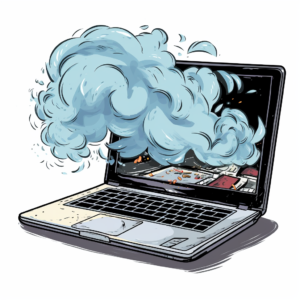
Laptops have become pretty indispensable for work, entertainment, and communication. However, one common issue that plagues laptop users is overheating. An overheating laptop not only hampers performance but also poses a potential risk to your device’s longevity. At Buzztime Electronics, we service many laptops with this problem and in this article, we’ll share the top symptoms, causes, and resolutions for an overheating laptop.
Symptoms of an Overheating Laptop
Identifying an overheating laptop is crucial to prevent potential damage. Some common symptoms of an overheating laptop include:
Excessive Fan Noise: Laptops have built-in fans that help dissipate heat. If you notice the fan running loudly or continuously at high speeds, it could indicate that your laptop is overheating.
Sluggish Performance: Overheating can cause your laptop’s CPU and other components to throttle down to reduce heat generation. As a result, you may experience slower performance, lag, or even freezing.
Unexpected Shutdowns: When a laptop gets too hot, it may shut down abruptly to prevent damage. If your laptop frequently powers off without warning, overheating could be the culprit.
Hot Keyboard and Bottom Panel: Place your hand near the laptop’s keyboard and bottom panel. If they feel unusually hot to the touch, it’s a sign that excessive heat is being generated within the device.
Screen Glitches: Overheating can affect the GPU (Graphics Processing Unit), leading to graphical goofs, artifacts, or screen flickering.
Now that you can recognize the symptoms, you can always give us a call if any of these get too bad to handle. Next, let’s delve into the potential causes of laptop overheating.
Why do Laptops become hot?
Dust and Debris: Over time, dust and debris can accumulate inside your laptop, blocking airflow and insulating components. This accumulation restricts the cooling system’s efficiency, leading to overheating.
Inadequate Ventilation: Placing your laptop on soft surfaces like beds or couches can obstruct the air intake and exhaust vents. Laptops need proper ventilation to dissipate heat effectively.
Heavy Multitasking: Running resource-intensive applications, such as video editing software or complex games, can put a significant load on your laptop’s CPU and GPU, leading to increased heat generation.
Old or Deteriorating Thermal Paste: The thermal paste between the CPU/GPU and the heatsink helps conduct heat away from these components. Over time, this paste can dry up or deteriorate, reducing its effectiveness.
Blocked Cooling System: Dust can accumulate inside the cooling system, blocking the fan blades or clogging the heatsink. This prevents efficient heat dissipation.
Running in High-Performance Mode: Some users may keep their laptops in high-performance mode at all times, which can cause the CPU to run at full speed constantly, generating excess heat and potential laptop charging issues.
Fixing Overheating Laptops
Now that we’ve identified the causes of laptop overheating, let’s explore some effective ways to keep your laptop running cool and smooth.
Regular Cleaning: Dust and debris are common culprits behind laptop overheating. Periodically clean your laptop’s vents and cooling system using compressed air. Ensure your laptop is turned off and unplugged during cleaning.
Elevate Your Laptop: Place your laptop on a hard, flat surface to ensure adequate airflow. Using a laptop cooling pad with built-in fans can further enhance cooling efficiency.
Limit Multitasking: Be mindful of the number of resource-intensive tasks you run simultaneously. Closing background applications and processes can help lower the CPU and GPU load.
Replace Thermal Paste: If your laptop is still overheating after cleaning and adjusting settings, consider replacing the thermal paste on the CPU and GPU. This can significantly improve heat conductivity.
Upgrade Your Hardware: If your laptop continues to overheat despite all efforts, it may be time to consider hardware upgrades. Adding more RAM or switching to a Solid-State Drive (SSD) can reduce the workload on the CPU, leading to lower heat generation.
Seek Professional Help: If you’re uncomfortable disassembling your laptop or performing advanced tasks like applying thermal paste, it’s best to consult a professional technician who can diagnose and resolve the issue.
Buzzline
Overheating laptops suck. You can try and fix them yourself using the steps above, and 9 times out of 10, it’ll do the trick. For that one time where it doesn’t solve the issue, you know where to find us.
